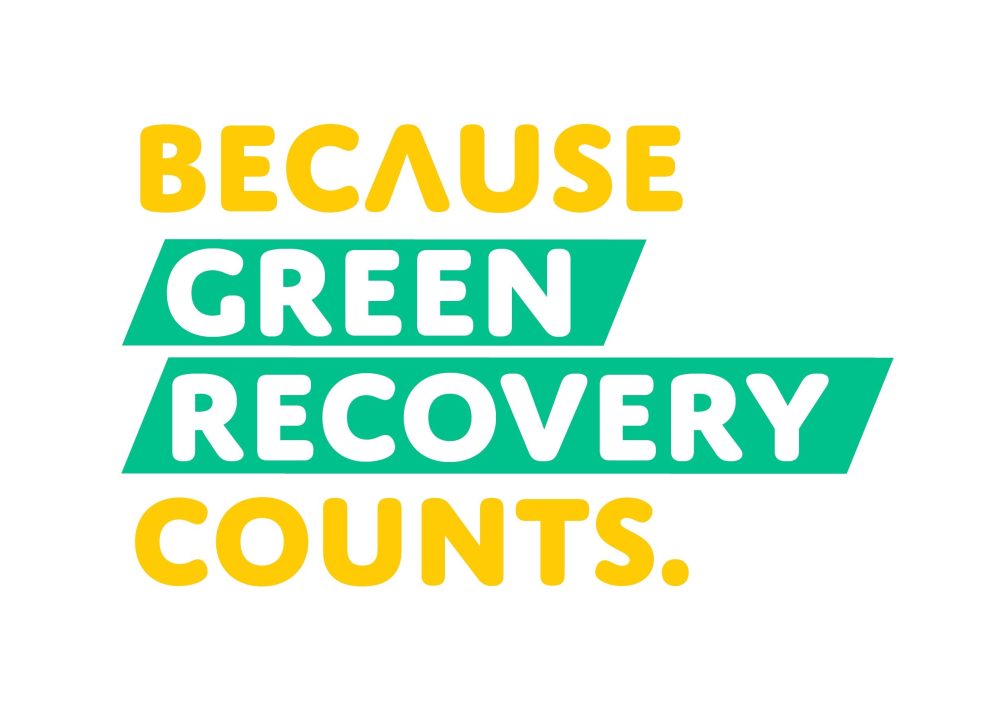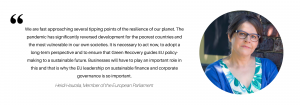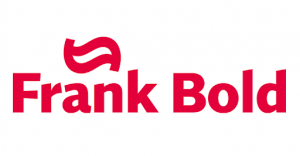
Accountancy Europe calls for the European Union and its national governments to move to a sustainable and resilient economy as part of recovering from the pandemic.
One lesson we can learn from this period is that we need to think long-term, and beyond financial risks. Recovery and sustainability go together. The choices we make now can improve or worsen the state of our planet. Building a sustainable economic environment should remain on top of the worldwide policy agendas. Public and private actors should apply their skills and powers to achieve a better future. We need to coordinate globally and coordinate across all sectors.

We need to start looking at the right risks, meaning: climate, biodiversity loss, natural disasters and human-made environmental disasters.
As the Portuguese Presidency has confirmed: Europe needs to promote a fair, green and digital recovery and needs to deliver it now.
European accountants will help drive this system change, contribute expertise to the debate and participate in relevant initiatives. Accountancy Europe will continue to promote open discussions, share feedback from practice, listen to other experts and progress the debate at European level.
Here are 4 ideas to get closer to a sustainable recovery in light of the COVID-19 pandemic:

SMEs are crucial in our economy. When they go under, society suffers; when they are not sustainable, we all pay the price. Accountants have the multidisciplinary expertise to help businesses of all sizes. They assess SMEs’ financial and non-financial impacts and risks and upgrade their risk management programmes. We have also identified 3 vital matters where accountants can provide crucial support in SMEs’ development. #SMEsCountOnUs
The only sustainable economy would be a circular economy. This means that most companies need to change their business models. Corporate governance is an essential driver of this transition. The cogito publication 10 ideas to make corporate governance a driver of a sustainable economy (June 2019) already sets out what boards and regulators can do to redefine how businesses are run.
Professional accountants working in the public sector are an important part of our membership. We just issued Coronacrisis: actions for the public sector with ideas on how the public sector can counter the crisis’ impact on the short and long term.
Accountants will have to help leveraging public finance to make the necessary investment in our health systems.
A lot of subsidies are being distributed: accountants must control that they are used as intended, and they will need to measure their efficiency.
With the prospect of growing debt in highly uncertain circumstances, we need to stress–test government borrowing, which requires proper financial information.
In addition to policy and support, the public sector can represent up to 50% of the economy in Europe. It is also time for the public sector to lead by example and integrate financial and non-financial performance.
We admire the European Commission’s courage in leading a sustainable recovery and the voices in the European Parliament who promote this objective. However, if the Member States rush back to business as usual, stimulating car sales and unconditionally subsidising airlines, we will not have the necessary strategic alignment to transform our economy. The private sector also needs to align. Praising the Commission’s objectives, while slowing down change will not make us sustainable in due time and we will collectively pay too big a price. We are all on the same unique planet.
“Because Green Recovery Counts” which calls for a move to a sustainable and resilient economy as part of recovering from the pandemic is supported by:
“CDSB is very pleased to be part of the Because Green Recovery Counts campaign. Since 2007, we have been supporting governments and regulators but also businesses to embrace the sustainability challenge through better corporate reporting practices. The current Covid crisis is a unique opportunity to further support such theory of change based on the EU momentum on sustainable finance.”
Mardi McBrien, CDSB CEO
 “As Europe recovers from the Covid-19 crisis, resilience and innovation will be central to ensuring our region remains competitive on the global stage. Investments in sustainability, made as part of the recovery efforts, are highly beneficial to the economy and society in both the short and long term. Such synergies should become key factors in the decision-making and funding allocation processes.
“As Europe recovers from the Covid-19 crisis, resilience and innovation will be central to ensuring our region remains competitive on the global stage. Investments in sustainability, made as part of the recovery efforts, are highly beneficial to the economy and society in both the short and long term. Such synergies should become key factors in the decision-making and funding allocation processes.
Governments must support the sustainability transition by setting clear transition paths and ensuring full transparency of public finances. They should also deliver the appropriate fiscal measures such as carbon tax or phasing out subsidies for certain sectors as well as incentives for greening the economy. Effective public measures will underpin banks ‘efforts in providing funding and support to clients on their transition journeys.
Wim Mijs, EBF CEO
 “If there is a silver lining to the Covid-19 pandemic it is the widening realization that economy, society and the environment do not act independently, and we need all three to function in harmony to overcome the challenges of the 21st century. Effective, integrated, corporate disclosure can be a transformational tool to achieve this harmony and create the sustainable economic environment the ‘Because Green Recovery Counts’ campaign champions. The commitment the EU has shown to developing a sustainable financial system must act as a catalyst globally, driving global actors to further integrate sustainability-related information into policy-making, capital allocation and decision-making on all counts.”
“If there is a silver lining to the Covid-19 pandemic it is the widening realization that economy, society and the environment do not act independently, and we need all three to function in harmony to overcome the challenges of the 21st century. Effective, integrated, corporate disclosure can be a transformational tool to achieve this harmony and create the sustainable economic environment the ‘Because Green Recovery Counts’ campaign champions. The commitment the EU has shown to developing a sustainable financial system must act as a catalyst globally, driving global actors to further integrate sustainability-related information into policy-making, capital allocation and decision-making on all counts.”
Charles Tilley, VRF Senior Advisor and Board Director
 “Our society faces an unprecedented series of challenges and systemic crises that require an equally unparalleled green transformation of the economy. Frank Bold is working on improving corporate transparency and responsibility in support of the climate and energy transition in Europe. The Corporate Sustainability Reporting Directive and development of EU standards is central to achieve the objective set in the Green Deal and the sustainable finance agenda. We welcome and support the campaign of Accountancy Europe to ensure that the road to recovery from Covid-19 is just, green, and focused on the long-term.”
“Our society faces an unprecedented series of challenges and systemic crises that require an equally unparalleled green transformation of the economy. Frank Bold is working on improving corporate transparency and responsibility in support of the climate and energy transition in Europe. The Corporate Sustainability Reporting Directive and development of EU standards is central to achieve the objective set in the Green Deal and the sustainable finance agenda. We welcome and support the campaign of Accountancy Europe to ensure that the road to recovery from Covid-19 is just, green, and focused on the long-term.”
Pavel Franc, CEO Frank Bold